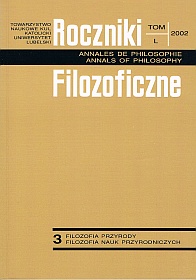Metaphysical and Epistemplogical Presuppositions in Stephen Hawking's Interpretation of the Creation of the Universe
Abstract
The article presents the evolution of Stephen Hawking's views on the creation of the universe from nothingness. After presenting the cosmological context of contemporary concepts of creation, the author presents controversial epistemological and metaphysical theses tacitly assumed byHawking. Their status is completely independent of the accepted physical interpretations. Consequently, one can accept Hawking's physics, while rejecting his epistemology and metaphysics.
While Hawking's work contains many interesting ideas on a physical level, his philosophy remains arbitrary and naive. It can be replaced by a much more critical study of philosophy, and therefore Hawking's proposals for creation must be considered metaphysically neutral. In the work of the late Hawking we find much more mature epistemological studies. His famous proposals for the creation of the world prove ultimately to be in line with the theistic interpretation of the quantum creation ex nihilo.
Copyright (c) 2002 Roczniki Filozoficzne

This work is licensed under a Creative Commons Attribution-NonCommercial-NoDerivatives 4.0 International License.





